by Alex Walsh
Published in the Musical News, November/December 2007
Chris Bogios currently holds the third trumpet position for the San Francisco Symphony. He is one of many dedicated orchestral musicians whose work on player negotiating committees during the 1960s, 70s, and 80s, led to fundamental changes in the Bay Area classical music scene.
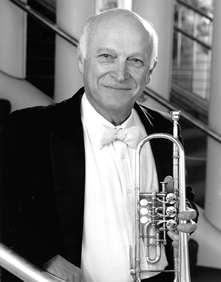
Chris today with “Symphonic Attire”.
Johnny Mathis may not know it, but Chris Bogios played trumpet in a San Francisco State musical called KamPus KaPers when he was an un-famous singer making a name for himself in the 1950s. And tonight, Chris says he’ll remind Johnny of that fact—he’s playing a special concert with him at Davies Hall. Not bad for a kid from Butcher Town.
Butcher Town? That was San Francisco’s Bayview District–a working class neighborhood full of Italians, Maltese, and Greeks. Probably not the first place you’d look to find a trumpet player for the San Francisco Symphony.
But the Symphony was a different animal back then. This was the wild west of symphonic music where, if you studied hard and played with a little pizzazz, you might have a chance of getting in. But there was no job security—you could be hired or fired on a whim. “The Joseph Krips years (‘63-’70) were really difficult,” recalls Chris,“ Sometimes I would come in and the whole string section would be reseated. That’s one of the reasons we went on strike in ’68. We created major contract changes. We got an audition system, tenure, and if they wanted to reseat someone in a section they had to show cause. We also got more weeks. It became a major orchestra contract.”
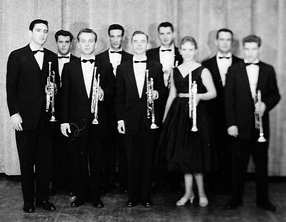
SF State Trumpet Section in the 50’s. Billy Catalano Jr. far left; Chris next to him.
Chris says he learned a lesson about conductors and loyalty when, after 7 years in the 1970s, Seiji Ozawa said to him,” This is my orchestra, I am not going to leave San Francisco.” But when Boston called him the next year, Ozawa was gone.
1980 introduced a new era for the San Francisco Symphony and Opera. With the construction of Davies Hall, the new home for the Symphony, there was less competition for use of the Opera House. Seasons were expanded. Since both organizations shared the same pool of players, the musicians had to decide which orchestra they wanted to play with. After 18 years with the Opera, Chris chose the Symphony. Today, he is proud of the Opera, Ballet, and Symphony contracts. “We have a great job,” he says, “and I go back to the days when it wasn’t what it is today.”
Chris won the 3rd trumpet seat in 1962. When Eddie Haug decided to retire, he moved up to 2nd trumpet. “In the early days, I played first trumpet a few times,” recalls Chris, “but I enjoy playing second trumpet to a really good principal. Everybody’s exposed playing trumpet anyway. It’s not like you’re going to hide–there’s only one person on the part. I think maybe that’s why brass players are happier people and more content in their jobs. Whether you’re playing 1st 2nd, or 3rd, you’re still playing your part. And if you don’t, nobody else is going to do it.”
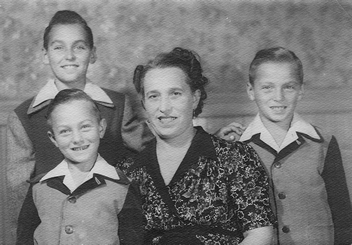
Brothers Tim and Tedd, “Mama”, and Chris.
Chris did not go to a music conservatory. Instead, he went to SF State, where he earned a BA and later a Masters, in music. Most of his friends were Korean War veterans studying on the GI Bill. They were older, experienced musicians who taught Chris the ropes. They were also regular dinner guests at his mother’s house. She was a tough lady who raised Chris and his two brothers on her own, after his father died. Chris’s parents were Greek immigrants. During WWII, his father worked the shipyards while his mother stayed home with the kids. After the war, like a lot of Greeks, his father and uncle opened a restaurant, which was located on Ellis and Mason in downtown San Francisco. Chris helped out as a dishwasher and waiter.
In Jr. High School, band was the only class he looked forward to everyday. He started with the cornet when he was twelve and says the first time he heard the ninth grade orchestra he thought it was the greatest thing in the world. At 13, he bought a cornet from his music teacher for $40 with money he made working in a butcher shop. He brought it home to his family, and played Taps after dinner. That night his father died unexpectedly.
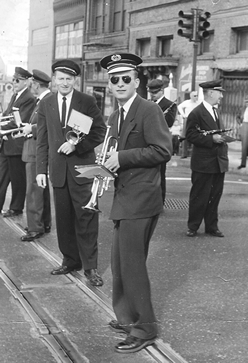
Playing a union parade gig.
To make ends meet, Chris’s mother became a seamstress. All three boys worked, and she would take half their salaries. Eventually, with money left by their father, together with their combined salaries, she was able to cobble together enough to buy a $12,000 house on San Bruno Ave. (“This was in the early 50s!” exclaims Chris).

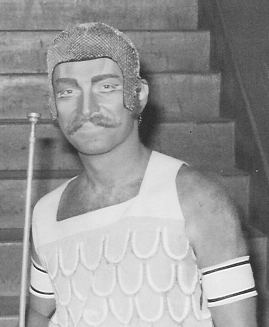
Playing “Aida” with full “grotesque” make-up.
Chris spent his teenage years working in butcher shops (and has the scars to prove it). At Balboa High, he took private lessons from his teacher, Mr. Gallatin, and paid for them himself. His first gigs included $25 services for Maltese bands, and a German band that rehearsed above an organ shop in the Potrero District. As his reading chops developed, dance bands began calling him for weekend gigs because he could sit down and read the book. “But when it came to taking a chorus,” he says,” If it wasn’t written out I would be scared as hell. So they would have the jazz guy do that.” Years later, Chris remembers improvising over a trumpet solo written out for an Ella Fitzgerald pops concert. Ella liked it so much she had him come out and take a bow.
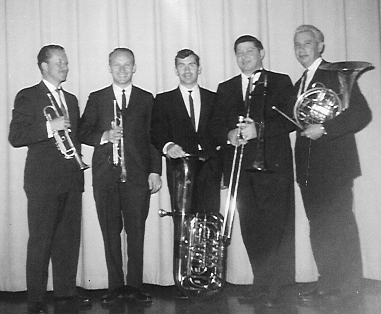
Camara Brass Quintet: Eddie Haug, Chris, Ron Bishop, Will Sudmeier, and Bill Sabatini.
Expecting him to live at home until he was married, Chris’s mother was shocked when he moved out of the house to go to SF State. He scraped by with gigging, teaching trumpet, and working in the occasional butcher shop. Having been a fan since high school of the popular Standard Oil Broadcasts performed by the SF Symphony, Chris finally got up the nerve to call the principal trumpet player, Charlie Bubb, and ask if he could take lessons. Charlie became his mentor.
Chris graduated from State in 1959 with a BA in music and a teaching credential. He subbed with the SF Symphony and Opera and was hired for My Fair Lady and Music Man at the Opera House, and he continued to work dance and musical jobs. In 1959, he auditioned to go on tour for nine weeks with the Boston Pops under Arthur Fiedler. This was a big job, paying over $190 a week! After that, he played in the Portland Symphony under a one year contract. The next year, Chris auditioned for, and won, the 3rd trumpet position in the SF Symphony. In 1962, he auditioned for the SF Opera and won that job as well. Chris also taught in the public schools, at San Jose State, and gave private lessons. Eventually he managed to buy a house in Mill Valley and raise a family. He has three kids, two of whom are professional musicians. His son Jim (a Local 6 member recruited by Chris) plays drums with Counting Crows, and oldest son Gus plays electric bass with a group called MALO. His daughter Denise is an avid symphony fan. And wife Bev? “She had to put up with three musicians in the family!” says Chris.
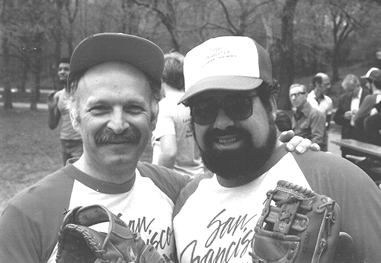
“Symphoniacs” baseball Team w/ principal trumpet Glenn Fischthal on right.
“It’s going to be tough to retire,” he says,” I’m seventy, and the chops aren’t going to last forever.” Two years ago, after a back injury, he returned to playing 3rd trumpet, which he says has extended his career. He continues to practice and to serve on committees. For younger players, Chris advises them to be wide awake as far as the chances of getting a major job. “It’s tougher now than it was when I was coming up. You didn’t have to compete against the whole world. We have a world economy, but we also have world competition to get an orchestra job.”
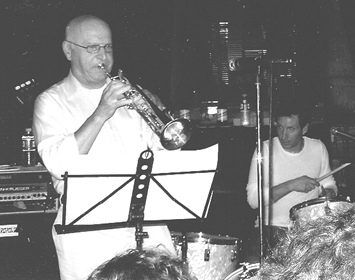
Playing (with music!) with son Jim and local group “Slider”.
Today, he says the symphony has a great brass section. He really loves and respects his colleagues and feels strongly that the SF Symphony has reached the point where it should be recognized on the same level as the big 5 orchestras (New York, Boston, Philadelphia, Chicago, and Cleveland).
And the worst thing about playing in the SF Symphony? “The commute,” laughs Chris, who now lives in Concord. “But, after all these years, I still love to play.”
